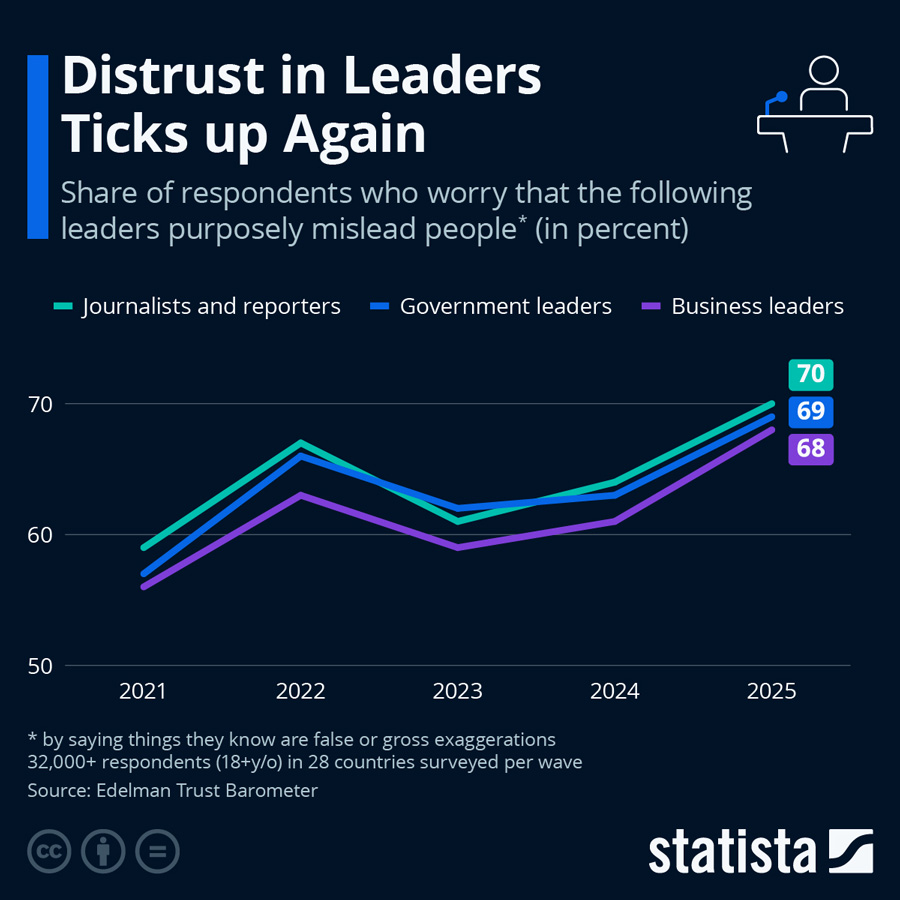Distrust In Leaders (And Journalists) Ticks Up Again
Tyler Durden
 Edelman has once more released its annual Trust Barometer, capturing a snapshot of how people around the world feel about today’s leaders. Edelman has once more released its annual Trust Barometer, capturing a snapshot of how people around the world feel about today’s leaders.
The findings are hardly positive, with survey data revealing that an increasing proportion of respondents across the 28 polled countries worry that government and business leaders as well as journalists and reporters are purposely misleading people by saying things they know are false or are gross exaggerations.
As Statista's Anna Fleck shows in the chart below, around seven in ten people believe this to be the case for each of the groups of leaders, with distrust against journalists and reporters most widespread, albeit marginally.

You will find more infographics at Statista
The share of people who worry about this has increased significantly since the survey was asked in 2021 (up 11-12 percentage points in each case).
Respondents in the lower income quartile reported feeling greater levels of distrustof these leaders than those in the top quartile.
Where 63 percent of high income respondents said they had trust in business, government, media and NGOs, the figure was just 48 percent among low income respondents.
Scientists and teachers were the favored voices when respondents were asked which groups of people they thought could be trusted to do what is right, at 77 and 75 percent, respectively.
More than 32,000 people were polled across 28 countries in each survey wave.
 our mission: our mission:
to widen the scope of financial, economic and political information available to the professional investing public.
to skeptically examine and, where necessary, attack the flaccid institution that financial journalism has become.
to liberate oppressed knowledge.
to provide analysis uninhibited by political constraint.
to facilitate information's unending quest for freedom.
our method: pseudonymous speech...
Anonymity is a shield from the tyranny of the majority. it thus exemplifies the purpose behind the bill of rights, and of the first amendment in particular: to protect unpopular individuals from retaliation-- and their ideas from suppression-- at the hand of an intolerant society.
...responsibly used.
The right to remain anonymous may be abused when it shields fraudulent conduct. but political speech by its nature will sometimes have unpalatable consequences, and, in general, our society accords greater weight to the value of free speech than to the dangers of its misuse.
Though often maligned (typically by those frustrated by an inability to engage in ad hominem attacks) anonymous speech has a long and storied history in the united states. used by the likes of mark twain (aka samuel langhorne clemens) to criticize common ignorance, and perhaps most famously by alexander hamilton, james madison and john jay (aka publius) to write the federalist papers, we think ourselves in good company in using one or another nom de plume. particularly in light of an emerging trend against vocalizing public dissent in the united states, we believe in the critical importance of anonymity and its role in dissident speech. like the economist magazine, we also believe that keeping authorship anonymous moves the focus of discussion to the content of speech and away from the speaker- as it should be. we believe not only that you should be comfortable with anonymous speech in such an environment, but that you should be suspicious of any speech that isn't.
www.zerohedge.com
| 

